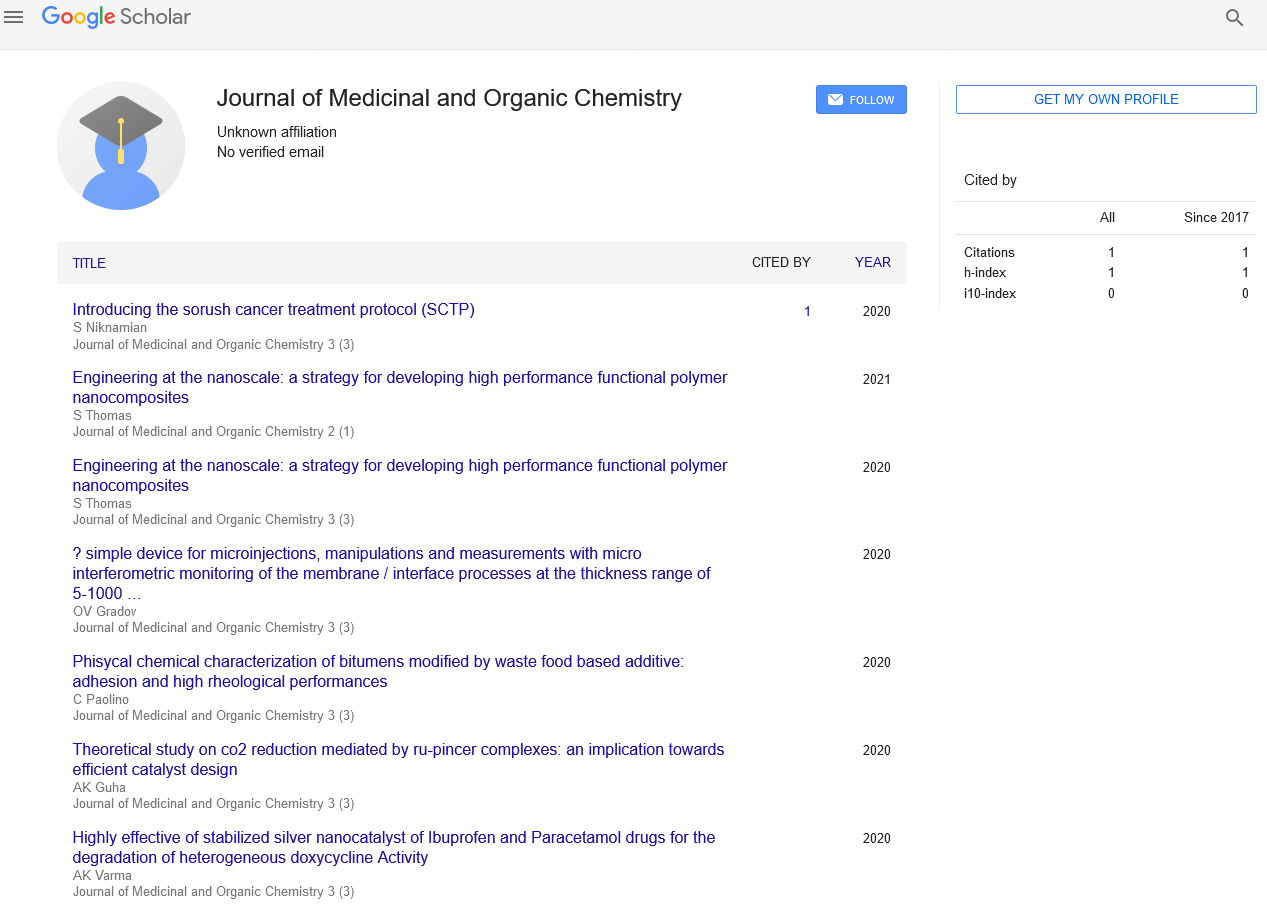Perspective - Journal of Medicinal and Organic Chemistry (2024) Volume 7, Issue 1
The Guardians Within: Exploring the Intricacies of Immunology
- Corresponding Author:
- Benjamin Risse
Department of Immunology,
University of Keidenberg,
Berlin,
Germany
E-mail: b.risseun@muenster.de
Received: 25-Jan-2024, Manuscript No. jmoc-24-126286; Editor assigned: 30-Jan-2024, PreQC No. jmoc-24-126286 (PQ); Reviewed: 13-Feb-2024, QC No. jmoc-24-126286; Revised: 22-Feb-2024, Manuscript No. jmoc-24-126286 (R); Published: 29-Feb-2024, DOI: 10.37532/jmoc.2024.7(1).163-164
Introduction
Immunology, the study of the body’s defense mechanisms against pathogens and foreign substances, unveils the remarkable intricacies of the immune system. From its role in protecting against infectious agents to its involvement in autoimmune diseases and cancer surveillance, immunology encompasses a diverse array of biological processes essential for maintaining health and combating disease. In this illuminating journey, we delve into the fundamental principles, groundbreaking discoveries and clinical applications shaping the dynamic field of immunology.
Description
Fundamental principles
At the core of immunology lies the immune system, a complex network of cells, tissues and molecules tasked with distinguishing self from non-self and mounting targeted responses to microbial invaders. The immune system comprises two main branches: The innate immune system, providing rapid but nonspecific defense against pathogens and the adaptive immune system, conferring long-lasting immunity through antigen-specific recognition and memory.
Cellular players
Key cellular players of the immune system include leukocytes or white blood cells, which orchestrate immune responses through specialized functions. Neutrophils, macrophages and dendritic cells serve as sentinels, engulfing and destroying pathogens through phagocytosis. Lymphocytes, including T cells and B cells, orchestrate antigen-specific immune responses, with T cells mediating cell-mediated immunity and B cells producing antibodies to neutralize pathogens.
Molecular mediators
Molecular mediators such as cytokines, chemokines and antibodies regulate immune cell communication and effector functions. Cytokines modulate immune responses by promoting inflammation, activating immune cells and regulating cell proliferation and differentiation. Chemokines guide immune cell trafficking to sites of infection or inflammation, facilitating coordinated immune responses. Antibodies, produced by B cells, recognize and neutralize pathogens through antigen binding and effector mechanisms.
Immune responses
The immune system employs a repertoire of strategies to combat pathogens, including innate immune mechanisms such as inflammation, complement activation and antimicrobial peptide secretion. Adaptive immune responses involve antigen recognition, activation of effector cells and establishment of immunological memory for enhanced protection upon reexposure to the same pathogen. Immunological memory forms the basis of vaccination, conferring long-term immunity against infectious diseases.
Immunopathology
Disruption of immune homeostasis can lead to immunopathological conditions characterized by aberrant immune responses against self or innocuous antigens. Autoimmune diseases, such as rheumatoid arthritis and multiple sclerosis, result from immune-mediated attacks on host tissues and organs, leading to chronic inflammation and tissue damage. Allergic reactions, triggered by hypersensitivity to environmental allergens, involve exaggerated immune responses that manifest as allergic rhinitis, asthma or anaphylaxis.
Cancer immunology
The intersection of immunology and oncology has led to groundbreaking discoveries in cancer immunotherapy, harnessing the power of the immune system to eradicate cancer cells. Immune checkpoint inhibitors, monoclonal antibodies and adoptive cell therapies have revolutionized cancer treatment by unleashing antitumor immune responses and improving patient outcomes. Additionally, cancer vaccines and immune-based combination therapies hold promise for enhancing tumor-specific immunity and overcoming immunosuppressive tumor microenvironments.
Clinical applications
Immunological principles underpin a myriad of clinical applications spanning diagnostics, therapeutics and vaccine development. Serological assays detect specific antibodies or antigens for diagnosing infectious diseases, monitoring immune responses and assessing vaccine efficacy. Immunotherapies, including cytokine therapies, monoclonal antibodies and immune modulators, offer targeted treatments for autoimmune disorders, immunodeficiencies and inflammatory conditions.
Future directions
The future of immunology holds immense promise, fueled by technological innovations, interdisciplinary collaborations and novel therapeutic approaches. Advancements in immunogenomics, single-cell sequencing and systems immunology promise to unravel the complexities of immune regulation and dysfunction, paving the way for precision immunotherapies tailored to individual patients. Furthermore, efforts to develop universal vaccines, combat emerging infectious diseases and overcome immune evasion mechanisms hold potential for reshaping the landscape of global health.
Conclusion
Immunology stands at the forefront of biomedical research, offering profound insights into the body’s defense mechanisms and avenues for combating disease. By unraveling the intricacies of immune responses and harnessing the power of immunomodulation, we embark on a journey of discovery and innovation with far-reaching implications for human health and well-being. As we continue to explore the guardians within, let us embrace the transformative potential of immunology to advance medical science, conquer infectious diseases and unlock new frontiers in personalized medicine.

